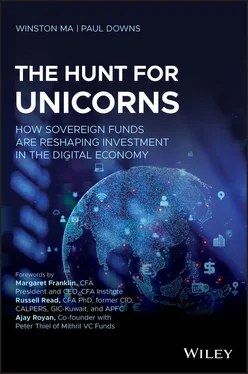My gratitude goes to many other outstanding friends, colleagues, practitioners and academics, who provided expert opinions, feedback, insights and suggestions for improvement. For anecdotes, pointers, and constant reality checks, I turned to them because they were at the front line of industry and business practices. I would particularly like to thank the friends at the West Summit Fund, which I set up at CIC in 2009 for cross-border investments between Silicon Valley and China. For the past 10 years, we had a fun journey together.
Special thanks to Frank Guarini (NYU'50, LL.M.'55), the seven-term New Jersey congressman and a long-term friend from the NYU law school community. With incredible vision and generosity, he continues to give me invaluable guidance, even when he is in his 90s. The time with this admirable leader has reshaped my way of thinking as well as me as a person. He has been a tremendous mentor and I thank him for continuously being a great cheerleader.
On its journey from a collection of ideas and themes to a coherent book, the manuscript went through multiple iterations and a meticulous editorial and review process by the John Wiley team led by the book commissioning editor Gemma Valler. Our long-term collaboration started with my 2016 book China's Mobile Economy (among “best 2016 business books for CIOs” by i-CIO.com), and we are working together on another new book “ The Digital Woe ” as a sequel (forthcoming December 2020). The managing editor Purvi Patel and copyeditor Caroline McPherson contributed substantially to the final shape of the book. Special thanks to Gladys Ganaden for her design of the book cover and figures.
And last in the lineup but first in my heart, I thank my wife, Angela Ju-hsin Pan, who gave me love and support. You are a true partner in helping me frame and create this work. Thank you for the patience you had while I wrecked our weekends and evenings working on this book.
Acknowledgements
Paul Downs
A global pandemic puts much in perspective, summoning gratitude to the fore. As I write this in quarantine, the only sounds punctuating the odd, pervasive silence of Manhattan are the sirens of the first responders. It is to them I must first acknowledge gratitude. Together with those who are keeping the logistics of food, medical care and basic services functioning as I sit safely at my laptop living the digital transformation that is the focus of this work.
Many others have been instrumental in bringing this book to fruition. My colleagues in the practice of law have imparted the knowledge on this topic that is not to be found in the server racks of the internet. Two, in particular, aided my understanding of the world portrayed in this book: Brett Dick, who authored the go-to book on the US tax treatment of sovereign investors and his successor in that role, Babak Nikravesh, who also accompanied me on countless visits to many of the sovereign investors who fill these pages, always offering insight and good company.
Thanks are due as well to Hogan Lovells who made possible the annual Sovereign Investor Conference that brought together thought leaders from the sovereign investors featured in this book. The panel participants and keynote speakers provided valuable, empirical insights to the themes of this book.
Reaching back in time, I must also recognize the contribution of two professors who contributed to my appreciation of international business transactions: Hal Scott, whose course at Harvard Law School provided the building blocks for a career in international business law; and the late Sergio Le Pera, Faculty of Law, University of Buenos Aires, whose mentorship in comparative law has stood the test of time.
In the present, no one has been more valuable than my co-author, Winston, whose insight, skilled editing and good natured collaboration have powered this book.
My family deserve my greatest thanks for indulging me in this project-- as well as in the preceding decades of travel and late night conference calls that laid the foundation of experience upon which this book is built. My daughters Lex and Liv, both of whom provided great support (while occupied full time respectively at a unicorn and at college). And most fundamentally, my remarkable spouse, Rebecca Downs, who was my reality check and patient source of sanity as this project absorbed me.
Winston Wenyan Ma, CFA & Esq.
Winston Ma is an investor, attorney, author, and adjunct professor in the global digital economy. He is one of a small number of native Chinese who have worked as investment professionals and practicing capital markets attorneys in both the United States and China. Most recently for 10 years, he was Managing Director and Head of North America Office for China Investment Corporation (CIC), China's sovereign wealth fund.
At CIC's inception in 2007, he was among the first group of overseas hires by CIC, where he was a founding member of both CIC's Private Equity Department and later the Special Investment Department for direct investing (Head of CIC North America office 2014-2015). He had leadership roles in global investments involving financial services, technology (TMT), energy and natural resources sectors, including the setup of West Summit (Huashan) Capital, a cross-border growth capital fund in Silicon Valley, which was CIC's first overseas tech investment.
Prior to that, Mr. Ma served as the deputy head of equity capital markets at Barclays Capital, a vice president at J.P. Morgan investment banking, and a corporate lawyer at Davis Polk & Wardwell LLP. Nationally certified Software Programmer as early as 1994, Mr. Ma is the book author of China's Mobile Economy (Wiley 2016, among “best 2016 business books for CIOs”), Digital Economy 2.0 (2017 Chinese), The Digital Silk Road (2018 German), China's AI Big Bang (2019 Japanese), and Investing in China (Risk Books, 2006).
Mr. Ma has served on the boards of multinational listed and private companies. He was selected a 2013 Young Global Leader at the World Economic Forum (WEF) and has been a member of the Council for Long-Term Investing and Council for Digital Economy and Society. He is a member of New York University (NYU) President's Global Council since inception, and in 2014 he received the NYU Distinguished Alumni Award.
Paul Downs Esq.
Paul Downs practiced international law for more than four decades, most recently as a partner at Hogan Lovells in New York, where he co-founded the Sovereign Investor Practice and initiated its annual Sovereign Investor Conference. He has represented sovereign investors transacting in assets globally, has spoken and published on the topic and guest lectured at Columbia and New York University law schools.
Mr. Downs served as President of the American Foreign Law Association, is a member of the Association of the Bar of the City of New York, the International Bar Association and the American Bar Association.
He is a current or past director of international companies and not-for-profit organizations, including International House, New York, The Council for the United States and Italy, and the China US Business Alliance. Paul is a graduate of Princeton University and Harvard Law School.
* * * * * * * * *
The authors can be reached on LinkedIn for comments and feedback on The Hunt for Unicorns: How Sovereign Funds Are Reshaping Investment in the Digital Economy .
Who holds the power in financial markets? For many, the answer will probably be the large investment banks, big asset managers, and hedge funds that are often in the media's spotlight. But increasingly a new group of sovereign investors, which includes some of the world's largest sovereign wealth funds, government pension funds, central bank reserve funds, state-owned enterprises, and other sovereign capital-enabled entities, have emerged to become the most influential capital markets players and investment firms, with $30 trillion in assets under management (“ super asset owners”).
Читать дальше












